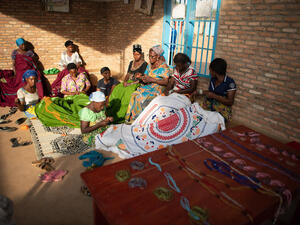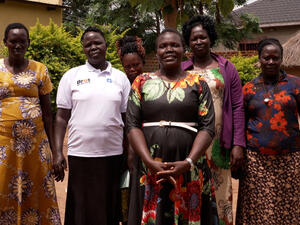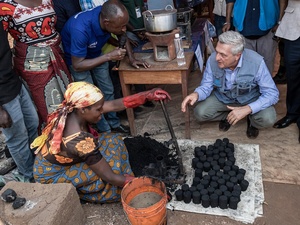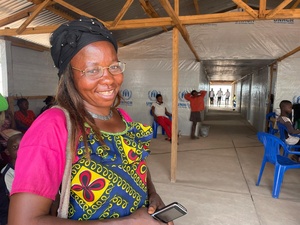UNHCR concerned about return of Nigerian refugees from Cameroon
UNHCR concerned about return of Nigerian refugees from Cameroon

A Nigerian refugee and her grandson prepare rushes to repair the fence of the courtyard in Minawao refugee camp.
UNHCR, the UN Refugee Agency, is concerned by continuing forced return of hundreds of refugees from Cameroon’s far north region to north-eastern Nigeria despite the recent signing of the tripartite agreement aimed at, among other things, ensuring the voluntary nature of returns.
So far this year, Cameroon has forcefully returned over 2,600 refugees back to Nigerian border villages against their will.
UNHCR is particularly concerned as these forced returns have continued unabated after the governments of Nigeria and Cameroon signed a tripartite agreement with UNHCR in Yaounde on March 2 to facilitate the voluntary return of Nigerian refugees when conditions were conducive.
Inside Nigeria, UNHCR teams have heard and documented accounts about Cameroonian troops returning refugees against their will - without allowing them time to collect their belongings. In one incident on March 4, some 26 men, and 27 women and children, were sent back from the Cameroonian border town of Amtide, in Kolofata district, where they had sought refuge, according to UNHCR monitoring teams in the border regions.
In Nigeria’s Borno State some refugees were rounded up during a military offensive against Boko Haram insurgents in the Mandara Mountains on the Cameroonian side of the border and were taken in trucks to a camp for displaced people in Banki. Those returned included a one-year-old child and a nine-month pregnant woman, who gave birth the day after her arrival in Banki.

During the chaos families were separated and some women were forced to leave their young children behind in Cameroon, including a child less than three years old. Returnees were given food and water by aid agencies and are now settled in the Banki camp for internally displaced people. UNHCR staff also recorded about 17 people who claimed to be Cameroonian nationals, and also reported that they were deported by mistake to Banki. It is common in this region to find people who lack documentary proof of their nationality.
While acknowledging the generosity of the Government of Cameroon and local communities who host over 85,000 Nigerian refugees, UNHCR calls on the Government of Cameroon to honour to its obligations under international and regional refugee protection instruments, as well as Cameroonian law.
The forced return of asylum seekers and refugees is refoulement, or forced return, and constitutes a serious violation of the 1951 Refugee Convention and the 1969 OAU Convention, both of which Cameroon has ratified.
In 2016, other groups of Nigerian refugees were deported to north-eastern Nigeria. On 14 June 2016 for instance, 338 Nigerian asylum-seekers, mainly women and children, were returned by the Cameroonian authorities of the Far North region from Kolofata back to Nigeria. The incident occurred just days after Cameroon, Chad, Niger and Nigeria adopted the Abuja Action Statement on protection in the Lake Chad Basin crisis, and reaffirmed among others, the importance of the principle of non-refoulement (non-return).
While recognizing the legitimate national security concerns of the Cameroon Government, UNHCR reminds authorities that refugees are themselves fleeing violence and attacks from Boko Haram and that their access to asylum and protection must be ensured.
In recent talks with the Cameroonian government, UNHCR has expressed the deep concern of the Organisation over the forced returns and sought reassurances from the Government about its commitment to the tripartite agreement. We also hope Cameroonian authorities will take the necessary steps to comply with international standards on the right to asylum and protection from refoulement.
Insecurity persists in parts of north-eastern Nigeria, and access to basic services remains limited. Most returning refugees find themselves in situations of internal displacement upon return and are unable to return to their places of origin.
The crisis in the Lake Chad Basin has displaced over 2.7 million people - including some 200,000 refugees into the neighbouring countries.
UNHCR calls upon Nigeria’s neighbours to continue keeping their borders open so as to allow access to territory and asylum procedures to persons fleeing the crisis in search of safety. UNHCR also continues to monitor the situation of refugees and returnees on both sides of the border.
For more information on this topic, please contact:
- In Geneva, Babar Baloch, [email protected], +41 79 513 95 49










